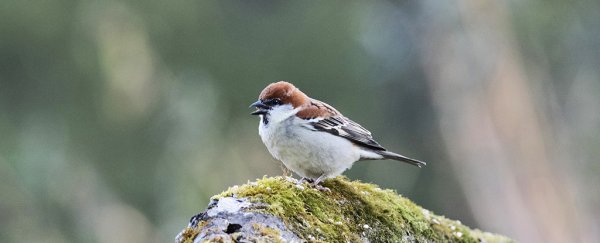It's fair to say that medicine is one of humanity's greatest accomplishments. From finding plants that can dull pain or slow infection, to producing multiple highly effective vaccines in less than 12 months for a brand-new virus, we can be pretty proud of our achievements as a species.
But we might not be the only species that knows certain things in nature can help treat our ills.
A new correspondence paper has put forward the idea that russet sparrows (Passer cinnamomeus) in China are using wormwood (Artemisia verlotorum) leaves in their nest as a preventative medicine, to reduce parasites and help their babies get bigger.
The conclusion that animals can use medicinal plants to their benefit is not necessarily new, pregnant elephants in Kenya eat a particular leaf to induce birth, while many other mammals use medicinal plants to self-medicate – sometimes to prevent disease or just generally feel better from an ailment.
But it's still pretty amazing that a tiny sparrow might know that some plants are more important than others for protecting against disease.
"In China, russet sparrows incorporate wormwood leaves into their nests around the same time that local people hang wormwood from their doors as a traditional custom during the Dragon Boat Festival," wrote the researchers in their new paper, led by Hainan Normal University ecologist Canchao Yang.
"The belief that this behaviour confers protection against ill health is supported by the description of anti-parasite compounds in wormwood. It has been suggested that the incorporation of fresh wormwood leaves into nests may serve a similar function for sparrows."
 A russet sparrow's nest with wormwood. (Yang et al., Current Biology, 2020)
A russet sparrow's nest with wormwood. (Yang et al., Current Biology, 2020)
To try and prove this, the team set up 48 pairs of nest boxes, one pair with 5 grams of wormwood, and the other with 5 grams of bamboo.
Once the nests began to fill with russet sparrows, the researchers also added either more wormwood, more bamboo or nothing each day, and weighed how much wormwood the sparrows themselves brought to the nest.
"Using a series of behavioural experiments, we show that the birds actively seek out nest locations close to the available wormwood and resupply established nests with fresh wormwood leaves gathered based solely on the leaves smell," says ecologist William Feeney, from Griffith University in Australia.
"The nests containing wormwood leaves had lower parasite loads. By decreasing the number of parasites such as mites, the sparrows that add more wormwood leaves to their nest produce heavier and healthier chicks."
Now, it's worth noting that we can't really tell if the sparrows themselves know that the wormwood is good for their babies. It's not like we can ask them, and maybe there's some other reason they collect it.
Perhaps more sparrows that liked its smell, used it and therefore survived to pass on their wormwood-smell-liking genes.
But the research is more solid evidence that we're not the only ones who use plants (and other things) for medicinal purposes.
"Our results indicate that russet sparrows, like humans, use wormwood as a preventative herbal medicine to protect their offspring against ill health," Feeney says.
"One has to wonder who is mimicking who?"
The paper has been published in Current Biology.
